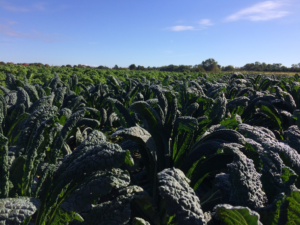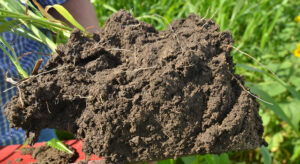Vegetable Crops Edition
Seasonal updates and alerts on insects, diseases, and weeds impacting vegetable crops. New Jersey Commercial Vegetable Production Recommendations updates between annual publication issues are included.
Subscriptions are available via EMAIL and RSS.
Quick Links:
 NJ Commercial Vegetable Production Recommendations
NJ Commercial Vegetable Production Recommendations
 Rutgers Weather Forecasting - Meteorological Information important to commercial agriculture.
Rutgers Weather Forecasting - Meteorological Information important to commercial agriculture.
EPA Awards Funding to Association of Farmworker Opportunity Programs for Farmworker Pesticide Training in New York, New Jersey and Puerto Rico
What produce safety concerns keep you up at night?
Work in or around produce safety? We have a new project that wants to know what produce safety concerns keep you up at night. In this anonymous online survey you will be asked to rank your top five produce safety risk management areas that need improvement. The information collected will be used to guide Extension work nationally and the development of resources to help manage risks and comply with regulations.
rank your top five produce safety risk management areas that need improvement. The information collected will be used to guide Extension work nationally and the development of resources to help manage risks and comply with regulations.
This survey should take about ten minutes to complete and there is no direct benefit to you for completing this survey. The first survey question, the informed consent, must be answered yes in order to proceed through the survey. The informed consent will give you more details about the nature of the survey, the handling of any information collected, and contact information should you have questions about this survey. Anyone involved in the produce industry who is at least 18 years of age may take this survey. Please click on the link below to enter the survey. https://go.rutgers.edu/4tuxsrdf
COVID 19: NJDEP Updates its Alert on Pesticide Paper License Delays – Includes Directions to Print Online Report
COVID-19: NJDEP Updates Pesticide Certification Exam Launch Date
U.S. Trade Rep & International Trade Commission Seek Grower Input For Section 201 Blueberry Import Investigation
As you may have read in this week’s NJ Farm Bureau newsletter or heard about elsewhere, following-up on a side comment about unfair trade practices concerning produce imports from Canada on an earlier phone call regarding the impact of COVID-19 on NJ agriculture, Congressman Jeff Van Drew arranged a meeting for growers with USDA Under Secretary for Trade and Foreign Affairs Ted McKinney. The meeting last week was hosted by Frank Donio Inc. Owner David Arena at his facility in Hammonton.
While Under Secretary McKinney provided an overview of his role through the USDA in working on trade deals for US products around the world, there was also a frank discussion about the need for farmer input into current investigations by the US Trade Representative and International Trade Commission (ITC). Called a Section 201 investigation, the ITC studies data from the agricultural community regarding import-export irregularities that cause unfair/unequal market access for American products. Such has been identified in the blueberry industry (see summary here).
Since the meeting, Representative Van Drew’s Legislative Assistant Haddon Antonucci provided the following summary of actions needed by South Jersey blueberry growers to be represented in the current investigation, including a request for your immediate attention as you must respond using the attached documents by Monday, November 16, a little more than a week from today.
This is Mr. Antonucci’s summary “regarding the Section 201 blueberry import investigation.”
“For access to the entirety of documentation and timelines for this project, go to this link: https://usitc.gov/blueberries
“The most important action item is ensuring that everyone in the South Jersey agricultural community fills out the ITC questionnaire. … attached [is] the producer questionnaire, there are also importer and purchaser questionnaires available on the website. This questionnaire collects proprietary information and will be used to help the ITC evaluate the impact of foreign imports of blueberries on domestic farmers. Also attached is a letter explaining the questionnaire and a document with ID codes.
“In order for the ITC to recommend action, there needs to be demonstrable harm to domestic industry. It is very important … to get this information to the ITC [to] demonstrate [any] deleterious impact that these imports have had on South Jersey agriculture.
“Please fill out this form as it pertains to your operations, and please provide it to other producers in the community as it pertains to their operations, particularly if they have not been contacted by the ITC yet.
“The deadline for the questionnaire is November 16. The point of contact at USTR is Jordan.Harriman@usitc.gov . Send [your questionnaire to] that email address once … completed. Congressman Van Drew’s office would like to be copied on your submission email so that he can file a holistic submission on behalf of the entire South Jersey agricultural community. Please cc haddon.antonucci@mail.house.gov with your submission to the ITC.
And in answer to a question about his original message, he stated:
“This particular investigation pertains to blueberries exclusively. There are high level discussions regarding imports of bell peppers. It is possible that there will be another section 201 investigation later this year for bell peppers, but that has not been initiated yet.
Soil Health Webinars Featuring Dr. James White Rutgers University Plant Pathology Professor, November 17th and 18th
 You may have seen this information in the November 5th “Morning Ag Clips” edition. If not, please see this information being reposted here about webinars on soil health being held on November 17th and 18th.
You may have seen this information in the November 5th “Morning Ag Clips” edition. If not, please see this information being reposted here about webinars on soil health being held on November 17th and 18th.
Healthy soil is within the reach of every farm and ranching operation. The principles that govern healthy, productive soils are simple: nourish, build and leverage the soil microbiome—work with nature instead of against it.
Exemplifying the belief that soil health is an opportunity and responsibility for every farm, Heliae® Agriculture has announced a virtual 2-day educational event: Rethinking Soil Productivity, to showcase soil health opportunities that farms in every geography, of all scope and scale, can take advantage of.
The live webinar experience will kick-off on November 17th at 11 a.m. eastern standard time with an in-depth discussion with renowned Rutgers University plant pathology professor, Dr. James White, who will be joined by Heliae Chief Revenue Officer, Norm Davy and Vice President of Agriculture Science, Dr. Karl Wyant. The trio will explore the soil’s microbiome through discussion and the examination of Dr. White’s research on the Rhizophagy Cycle. The session promises to offer insight into the newly discovered process of a plant’s ability to “farm” the beneficial microbes it needs and fundamental management strategies that can be implemented within any production model.
Day 2 on November, 18th, brings the Heliae® Agriculture science, research and sales team together in a discussion that focuses on the creation of a healthy soil biome. Here, the team will take a deeper look at the multitude of benefits that come from working with nature rather than against it, sharing the timeline of the PhycoTerra team’s research and discovery, and the efficacy and return on investment a regenerative approach brings to any farming operation. Both sessions will feature a dedicated live Q&A segment to allow viewers to submit questions to the panels of professionals for real-time answers, and will offer participants the opportunity to earn four Certified Crop Advisor (CCA) continuing education units (CEUs) in the following areas:
Approved CEUs (4 Total)
Nutrient Management: 1
Soil and Water Management: 1
Crop Management: 1
Professional Development: 1
Each day will also feature breakout sessions that focus on showcasing regional PhycoTerra® trial results. Breakout sessions will be hosted and presented by the Heliae® Agriculture team with live Q&A provided for every session.
Sessions will include:
NOVEMBER 17TH:
Florida & Georgia – Berries, Leafy Greens & Potatoes
•Time: 2:00 PM EST
Canada – Wheat & Canola
•Time: 3:00 PM EST
Midwest – Corn & Beans
•Time: 4:00 PM EST
NOVEMBER 18TH:
Spanish Speaking
•Time: 2:00 PM EST
Pacific Northwest – Potatoes & Wheat
•Time: 3:00 PM EST
Arizona & California – Strawberries, Almonds & Leafy Greens
•Time: 4:00 PM EST
For more information on the 2-Day Webinar experience: Rethinking Soil Productivity or to register visit: https://bit.ly/3euoMnW
